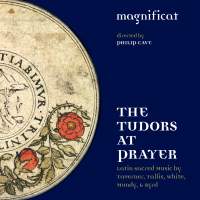Texte paru dans: / Appeared in:
*

International Record Review - (07-08//2014)
Pour
s'abonner / Subscription information
Linn
CKD447

Code-barres / Barcode : 0691062044721
Founded in 1991 by Philip Cave, Magnificat has made an impressive name for itself particularly in the field of Early Music. Recordings have mainly concentrated on music from sixteenth‑century Europe, and with this latest release the focus is on English music written over a 40‑year period from 1530. This was, as the booklet notes tell us, 'a time of vast religious and political upheaval', adding rather more poetically than convincingly, 'If a group of foreign visitors to Canterbury Cathedral in 1530 had returned to hear evensong there in 1570, they would have found the whole thing almost unrecognizable. Since the service which we now know as Evensong really first came into existence in the Prayer Book of 1549, and it was a further ten years before the famous admonition appeared ('In quires and place where they sing here followeth the anthem’), which effectively sanctioned the inclusion of a non‑liturgical choral item sung in English,it seems obvious that any foreign visitors would have found such a service strange.
In any case, it seems highly unlikely that any of the eight Latin motets included on this disc was ever sung at Evensong in Canterbury (or any other English) cathedral during the sixteenth century, and a more realistic reason for their creation comes
elsewhere in the booklet, where it is suggested that 'English musicians went on composing vocal music for their own enjoyment.' This disc, however, presents performances which do not so much indulge in personal enjoyment as savour the textural intricacies of music which is, considering its very narrow origins, remarkably varied.
The earliest music here is Taverner's Quemadmodum desiderat cervus, a setting of verses from Psalm 42, which survived as a purely instrumental work copied into a domestic manuscript during the Elizabethan age and was only recently, rediscovered as a choral work. Its six‑part texture displays the great strengths of Magnificat: a wonderful purity of tone, a direct vocal focus which illuminates the polyphonic lines with startling clarity and a lovely sense of long‑breathed lines inter‑weaving gracefully in a richly detailed whole.
William Mundy's huge Vox patris caelestis is, at almost 22 minutes, far longer than any anthem sung at Evensong, and its references to 'flowering vines' and 'heavenly ambrosial scent' would seem to lend weight to the suggestion that it was written for the celebrations marking the accession to the throne of Queen Mary in 1553; celebrations which included a 'Pageant under a Vine'. Most impressive here are the absolute precision of pitch and impeccable balance of Magnificat. This is a long, often complex score, yet it seems to float along, its wonderful buoyancy enhanced by the gorgeous purity of the sopranos.
The thicker textures of Robert White's Tota pulchra es are equally well defined, the singers not so much relishing the enticing harmonic clashes as gliding through them with unfailing precision. Again, the way in which Cave creates a sense of timelessness with the long, flowing phrases seeming to float ethereally is one of the most impressive aspects of this performance. This characteristic of Magnificat's performances is even more vividly demonstrated in a deliciously poised account of Byrd's Tribue, Domine, a performance of such complete security and control that it is hard to imagine any choir doing it better.
Small differences in pitch
between tracks indicate different recording sessions but these do not
seriously disturb, and texts and translations seem a little too squeezed to
be of any really practical value. Otherwise, this is a superb release,
presenting wonderful music in performances characterized by impeccable
precision and focus and recorded with an easy clarity.
Fermer la fenêtre/Close window
Cliquez l'un ou l'autre
bouton pour découvrir bien d'autres critiques de CD
Click either button for many other reviews


